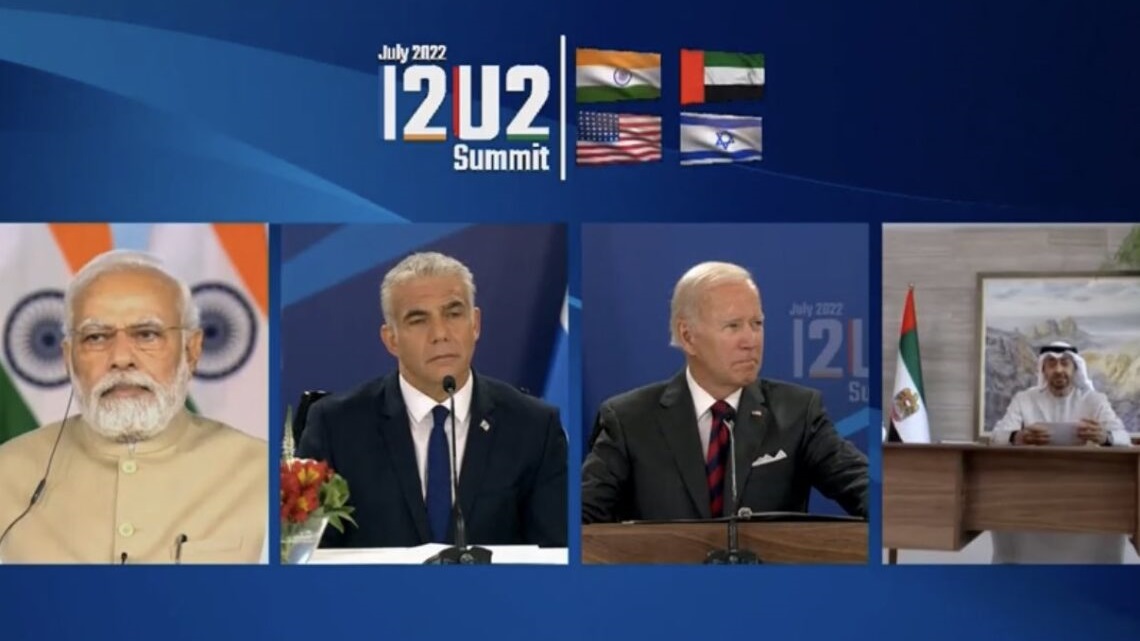On Thursday, July 14, the Indian PM Narendra Modi, Israeli PM Yair Lapid, UAE President Mohammed bin Zayed Al Nahyan and US President Joe Biden met virtually for the first Head of Governments’ iteration of the I2U2 group, which claims to bring the four countries together to “tackle some of the greatest challenges confronting our world.” The meeting came as part of Biden’s trip to Israel and Saudi Arabia, an undertaking that has been met with controversy as the American president sidelined human rights activists’ demands to pursue geopolitical interests in the region.
Described by some as West Asian “Quad,” the group was formed in October 2021 by the foreign ministers of the four countries. According to a joint statement released by the four Heads of Government following the meeting, the group seeks to accelerate “joint investments and new initiatives in water, energy, transportation, space, health, and food security.” Analysts have brought the motivations for the group’s formation into question, with some arguing that it is one of the latest developments in Biden’s containment strategy of China, while others believe that it may be a primarily UAE-driven initiative to increase technological and economic power.
Ahead of Biden’s trip to West Asia, a senior official from the administration described the president’s intention to “focus on Israel’s increasing integration into the region,” by not only bolstering existing ties with countries that recently normalized relations under the Abraham Accords (such as the UAE), but by also strengthening relations amongst “entirely new groupings of partners, including Israel, India, UAE, and the United States.” In their statement, the four leaders reaffirmed their “support for the Abraham Accords and other peace and normalization arrangements with Israel,” referring to the “economic opportunities that flow from these historic developments, including for the advancement of economic cooperation in the Middle East and South Asia.”
While some see India’s participation in the I2U2 group as economically-motivated, former Indian diplomat M.K. Bhadrakumar described the meeting as part of a larger diplomatic game that Biden is playing in the region, with the ultimate goal of reaping the oil benefits of Saudi Arabia. Bhadrakumar explained that Biden has stated openly that the trip “is about America’s return to West Asia,” with aims of “regaining lost influence in the region” and “countering the increased influence of China and Russia.” As such, “none of these things are really serving Indian interests.”
The group’s meeting comes at a time where India-Israel relations have seen a sharp improvement ever since the Modi government came to power in 2014. India is Israel’s largest arms buyer, making up 42% of Israeli arms exports, at an estimated annual value of $1 billion. Between 2015-2019, Indian arms imports from Israel have seen a 175% increase. The two countries have also seen increased ideological proximity, as human rights organizations condemn both governments for similar violent approaches towards Palestinians, minorities, and dissenters.
The meeting emerged with two primary initiatives. The first, which seeks to address food insecurity, involves a $2 billion investment from the UAE “to develop a series of integrated food parks across India.” In addition to Emirati economic support, “US and Israeli private sectors will be invited to lend their expertise and offer innovative solutions that contribute to the overall sustainability of the project.” The second initiative “will advance a hybrid renewable energy project in India’s Gujarat State consisting of 300 megawatts (MW) of wind and solar capacity,” with investment from the UAE and intended support from Israel and the US.
According to Bhadrakumar, the agricultural initiative outlined in the statement is “nothing new.” Rather, these initiatives have been going on, but have now been articulated explicitly by the group for the optics of “economic diplomacy.” In the 2006 Indo-Israel Agriculture Project, Israel claimed to contribute its “best-practices and knowhow” for increased productivity and efficiency. Israeli agricultural practices have been heavily criticized by human rights activists with the allegation of “greenwashing,” where so-called sustainability practices contribute to displacement and theft of Palestinian land and mask the state’s apartheid policies. According to Jessica Anderson of Visualizing Impact, Israel’s “techniques such as drip irrigation, desalination, and wastewater reuse” contribute to “food insecurity and de-development” for Palestinians. She explains that “corporate-dictated, government-approved” Israeli water management and agricultural practices seek to maximize productivity, while harming Palestinian ecosystems and indigenous farming practices.
In November 2020, the Boycott, Divestment, and Sanctions (BDS) India campaign authored a study in consultation with the All India Kisan Sabha, which studied the damaging role of Israeli agriculture company Netafim in Tamil Nadu. The study revealed how the drip irrigation company operated under the pretext of “sustainable development” to “impose contract farming models in India,” fostering displacement and instability in farming communities.
I2U2’s proposed initiative, which aims to “maximize crop yields” appears to continue a pattern of Israeli agribusiness companies involving themselves in Indian agriculture while perpetuating apartheid practices back home. “Ultimately,” Bhadrakumar says, “the Israelis are probably the only beneficiaries in the sense that they have now gotten a format, at a time when the Abraham Accords have lost their momentum.”





